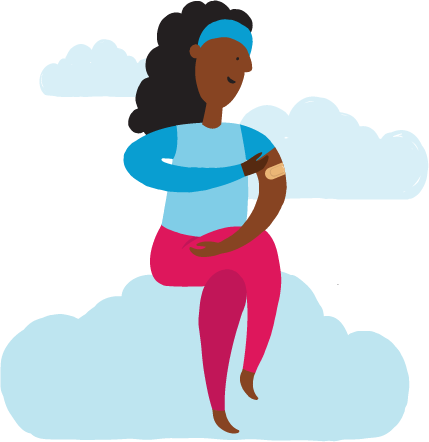April 6, 2021
12 ways to help people expand their awareness around vaccines and create a healthier world
The push is on to get the world vaccinated against COVID-19, and as evidenced by the recent Business Roundtable’s Move the Needle campaign, there are a growing number of companies helping to contribute to vaccination efforts.
To start a conversation with your employees, customers and communities, we have compiled ideas and trusted resources to expand their awareness around vaccines and bring them to a place of understanding and then, action. This list comes from Benevity’s Missions module on vaccine awareness, which is intended to build awareness of vaccines and their importance.
According to Edelman’s 2021 Trust Barometer, business is the most trusted institution and is expected to address societal issues:
Business must embrace its expanded mandate and expectations, with CEOs leading on a range of familiar and unfamiliar issues. It's important to take meaningful action first and then communicate about it.
–Edelman’s 2021 Trust Barometer
Consider sharing the following list with your people to help them learn and take action:
1. Start with the history (like the smallpox vaccine in 1796) and dig into the success stories we have already had with vaccines. Read about the history of vaccines from credible sources, like the World Health Organization (WHO) and the Centers for Disease Control and Prevention (CDC). History is solidly in favor of vaccines; science and medicine continue to advance, and today’s vaccines are safer and more effective than ever.
The Conversation shows how four major vaccines changed our world.
2. Get the basics on vaccine safety and effectiveness. The most important thing to remember is: You are far more likely to be injured by a vaccine-preventable disease than by a vaccine. The World Health Organization has overseen the development of many global vaccines. Read what they have to say.
3. Find out what herd immunity means and how to achieve it. Herd immunity is how humans naturally build a protective wall around themselves against infectious diseases. It relies on reaching a percentage of the population that is immune or have antibodies, either through having had a disease or by vaccination.
4. Distinguish between the different types of vaccines. Any vaccine you might encounter is a good vaccine. It has undergone development, testing, scrutiny and rigorous approvals to make it out into the public. They are all different in their own unique formulations and use, but each contains an antigen that will boost your immune system.
Fifty-five percent trust the CEO of the organization they work for to tell the truth about the vaccine.
–Edelman’s 2021 Trust Barometer
5. Learn about getting a vaccine through clinical trials. Racing to bring a vaccine to market does not mean taking shortcuts. The only way to speed up the process is to act early, involve more people and materials in research and development stages, and conduct clinical trials. Learn about the three phases of clinical trials that must be undergone before any vaccine can be released.
6. Learn how vaccines are approved by governments and health bodies. Developing a vaccine and bringing it to market is a massively complex undertaking. On a website built by the World Health Organization called The History of Vaccines, you can watch a three-minute video of Dr. Paul Offit describing the general process of making a vaccine.
7. Acknowledge that vaccine hesitancy is a complex issue. Various factors can lead to people being hesitant about vaccines: religion, politics, trust in government institutions, misinformation on social media and more. UNICEF and the Yale Institute of Global Health have a downloadable guide that helps engage everyone to bring them to a place of understanding and then, action.
8. Go to the source and debunk the myths. The World Health Organization exists to ensure that people around the world are kept safe and that vaccines are embraced by everyone. There really is no other agenda other than saving lives.
Listen to what Dr. Sylvie Briand has to say about myth vs. science on the WHO website.
There is more to the myth about vaccines causing autism, and a deeper dive is a good idea.
Over 80 percent of respondents expect pandemic updates from their employers on a weekly or more frequent basis.
–Edelman’s 2021 Trust Barometer

9. Learn to recognize misinformation and prevent its spread. Social media has created the perfect venue to share misinformation, and vaccines are a hot topic. Many people rely solely on social media for their “news,” and mistakenly assume that anything they read must be factual. Science will triumph over myth as long as people embrace it. A good place to start in combating misinformation is a fact-filled journal like Science Daily.
10. Give to organizations on the front lines of vaccination. Choose a cause and help them. It’s really that simple. Each one of the organizations on the list below is doing important work somewhere in the world to ensure people are kept safe through vaccines:
UNICEF
Charities Aid Foundation (GAVI)
Direct Relief
International Medical Corps
11. Roll up your sleeve and volunteer for the vaccination effort. Contact your local health authority to find out if vaccine volunteers are needed in your area. Be sure to indicate any medical training you might have, but remember that many roles need to be filled. Some volunteers are helping with physical setup of clinics, while others are assisting on phones and greeting patients.
12. Identify a cause that’s leading the way, and follow it on social media. Charitable organizations like UNICEF get a big boost from donors and volunteers, but also from people sharing their message on social media. Explore all the social media avenues available on a nonprofit’s website:
https://www.facebook.com/UNICEF-USA/
https://twitter.com/UNICEF
https://www.instagram.com/unicef/
https://www.youtube.com/unicef
https://www.linkedin.com/company/unicef/
Looking for more ways to enable your people to take action and track their impact? Connect with us to learn more about Missions.
You can also download our campaign kit to help mobilize your employees to volunteer and donate to nonprofits who are making a difference:
Help Your People Rally Around the Vaccine Rollout To End the Pandemic

